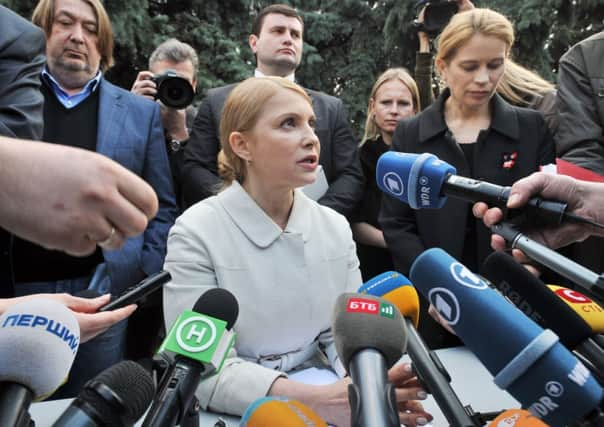IMF offers Ukraine bailout with strings


Following talks with Kiev’s interim government, the IMF pledged £8.5 billion-£11 billion in assistance over the next two years, in an agreement which should also help Ukraine secure funds from the United States and the European Union. The loan amount is roughly two-thirds of Ukraine’s entire annual state budget.
Political instability in the past few months has inflicted severe pain on the Ukrainian economy with the hryvna losing a third of its value against the dollar since the start of the year.
Advertisement
Hide AdAdvertisement
Hide AdPrime minister Arseny Yatsenyuk said Ukraine had been forced to “the brink of bankruptcy”, by chronic corruption and an inability to reform. He said Ukraine was short of 289 billion hryvna or £15.5bn.
The IMF blamed the previous government of president Viktor Yanukovich for stifling growth and bringing foreign currency levels to a critically low level. It said Ukraine’s “macroeconomic imbalances became unsustainable over the past year.”
US President Barack Obama backed the IMF’s offer of assistance. “This significant support will help stabilise the economy and meet the needs of Ukrainian people over the long term because it provides the prospect for true growth,” said Mr Obama at a joint press conference with Matteo Renzi, the Italian prime minister, in Rome, adding that he considered it a “major step forward for Ukraine.”
News of the agreement broke just as Yulia Tymoshenko, a leader of Ukraine’s 2004 Orange Revolution and a former prime minister, announced that she would run for the presidency in elections scheduled for 25 May.
She served three years in jail after being found guilty of corruption on what supporters say were trumped up charges.
She was released last month and said she decided to enter the presidential race because “none of the politicians understand the depth of lawlessness [in the country] and nobody wants to end it as desperately as I do.”
Although a divisive character many Ukrainians regard as a member of the corrupt elite they blame for the country’s ruin, Mrs Tymoshenko may benefit from public ire over austerity measures that come as conditions attached to the IMF deal.
“The time has come to tell the truth, to do difficult and unpopular things,” Mr Yatsenyuk explained in an address to parliament. One of the unpopular measures could be a 50 per cent hike in the price of gas for domestic consumers, and a 40 per cent rise for businesses. Although Kiev said it would provide assistance to the poor for many Ukrainians the big price rise will come as an unwelcome shock.
Advertisement
Hide AdAdvertisement
Hide AdRising gas prices will also hit heavy industry in the volatile east of Ukraine and further fuel opposition to Kiev rule along with adding to separatist calls for union with Russia.
As an indication of the strength of opposition to austerity, the Ukrainian parliament rejected a bill introducing the stringencies demanded by the IMF at its first reading.
Adding to the pressure on Kiev is the fear Russia might try to slice off a chunk of Ukrainian territory in the east by launching an invasion. It follows the break away of Crimea from Ukraine to be part of the Russian Federation.
Andriy Parubiy, the head of Ukraine’s National Security and Defence Council, said Russia now had 100,000 troops massed on the Ukrainian border, “in the south, in the east and in the north”.
But US defence officials said the actual number of Russian troops was around 20,000.